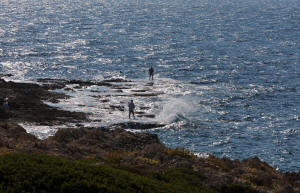|
Lebanese President Michel Aoun signed a letter approving the
deal in Baada, followed by Prime Minister Yair Lapid's signature
in Jerusalem, with a handover ceremony of less-senior
delegations set to take place at the UN peacekeeping base in
Naqoura along the border.
Lapid hailed the deal as a "tremendous achievement" and Lebanese
negotiator Elias Bou Saab said it marked the beginning of "a new
era" between the two sides, which nevertheless remain
technically at war.
The accord removes one source of potential conflict between
Israel and Iranian-backed Lebanese group Hezbollah and could
help alleviate Lebanon's economic crisis.
After meeting Lebanon's speaker of parliament Nabih Berri, Amos
Hochstein, the U.S. envoy who mediated the negotiation, told
reporters he expects the agreement to hold even amid changes in
leadership in both countries.
Hochstein referred to both upcoming elections in Israel on Nov.
1 and the end of Aoun's term on Oct. 31, saying the accord
should be kept up "regardless of who is elected very soon as
next president of Lebanon".
An offshore energy discovery - while not enough on its own to
resolve Lebanon's deep economic problems - would be a major
boon, providing badly needed hard currency and possibly one day
easing crippling blackouts.
While Lebanon and Israel have both voiced satisfaction with
having settled a dispute peacefully, prospects for a wider
diplomatic breakthrough appear remote.
"We have heard about the Abraham Accords. Today there is a new
era. It could be the Amos Hochstein accord," Saab said,
referring to the 2020 U.S.-brokered normalisation of ties
between Israel and the United Arab Emirates and Bahrain.
Lapid said: "It is not every day that an enemy country
recognises the state of Israel, in a written agreement, in view
of the international community," Lapid told his cabinet in
broadcast remarks.
Aoun however played down any wider breakthrough and said in a
statement that the deal "has no political dimensions or impacts
that contradict Lebanon's foreign policy".
(Reporting by Maayan Lubell and Maya Gebeily; Writing by Maayan
Lubell; Editing by William Maclean and Nick Macfie)
[© 2022 Thomson Reuters. All rights
reserved.] Copyright 2022 Reuters. All rights reserved. This material may not be published,
broadcast, rewritten or redistributed.
Thompson Reuters is solely responsible for this content.

|
|




